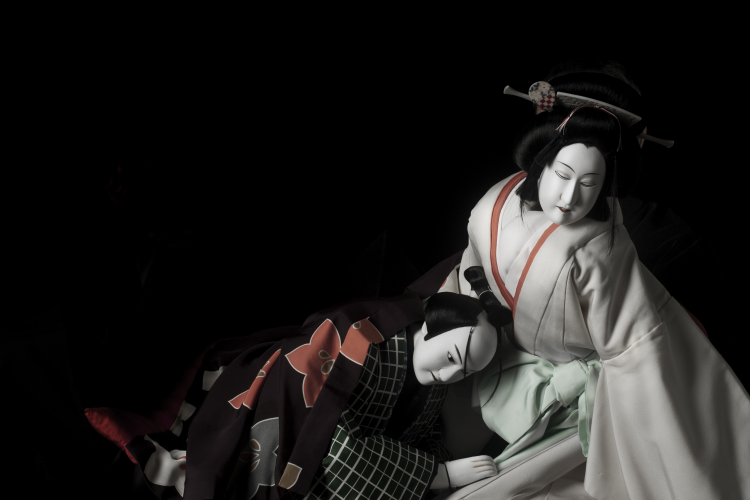Sugimoto Bunraku Sonezaki Shinju: The Love Suicides at Sonezaki
Created by Hiroshi Sugimoto, based on an 18th-century drama by Chikamatsu Monzaemon
Produced by Lincoln Center White Light Festival
Off Broadway, Traditional Japanese Play with Puppetry and Music
Runs through 10.22.19
Rose Theater, Jazz at Lincoln Center's Frederick P. Rose Hall, 10 Columbus Circle
by Ran Xia on 10.22.19
 Ohatsu and Tokubei in Sugimoto Bunraku Sonezaki Shinju: The Love Suicides at Sonezaki.
Ohatsu and Tokubei in Sugimoto Bunraku Sonezaki Shinju: The Love Suicides at Sonezaki.
Photo by Hiroshi Sugimoto/ Courtesy of Odawara Art Foundation.
BOTTOM LINE: Hiroshi Sugimoto brings Bunraku puppet theatre to the U.S. with this modern retelling of Chikamatsu's classic 18th-century drama.
Across many cultures, many tragic romance stories end with the good ole star-crossed-lovers committing double suicides (or at least both dying), whether by miscommunication of well-intentioned allies, or through their us-against-the-world will power. There’s Romeo and Juliet (which traces back to Pyramus and Thisbe), Tristan and Iseult, and the Chinese butterfly lovers Liang Shanbo and Zhu Yingtai (where upon their death, the lovers’ spirits turned into a pair of butterflies, ergo the title). I’ve always felt suspicious of such tales, with their idea of a love so powerful that the couple is willing to die together—is that really possible? After all, don’t we all die alone in the end? In this light, I found The Love Suicides at Sonezaki incredibly moving, in rather surprising ways.
Based on an 18th-century drama, the story is simple (albeit involving twists and turns of the lovers’ ill fate). To put it plainly: Ohatsu, a prostitute at a teahouse, and Tobukei, a clerk to a soy sauce merchant, are unable to be together because of their circumstances. So they choose to consummate their love by dying together, which will grant their souls entrance to the Buddhist realm of the afterlife. They steal away in the night to the forest Sonezaki where they use a blade to end their lives. The whole synopsis is provided in the playbill, and much like an opera where the lyrics are perhaps not as important as the emotional impact, the strength of The Love Suicides come from the exquisite craftsmanship of the Bunraku puppets, the palpable passion from the storytellers and musicians, and the overall quality of the production.
Watching a show performed entirely in Japanese (accompanied by samisen, drums, and other traditional Japanese instruments), it’s quite impossible to understand the nuance in the original text, even with English supertitles. But for those of us not fluent in Japanese, perhaps this just helps us notice all the more the authentic flesh and blood emotions the puppeteers are able to convey with puppets who can’t use facial expression to “act.” The love between Ohatsu and Tobukei is readily felt: their interactions are tender, poignant, tragic (since we know from the get go their fates), and at the same time, funny.
Though a tragedy, the show has dynamic plot points as well as comedic moments that, no matter what language you speak, you’ll be able to understand, because human nature never needs translation. We meet the earnest lovers who are willing to sacrifice everything for each other, the greedy merchant who causes the downfall of our protagonist, as well as the teahouse maid who sleeps in the nude (yes, there is a puppet nude scene).
It’s easy to approach a tragic tale with an aesthetic that’s fully bleak and dreadful, which is why I applaud Hiroshi Sugimoto‘s effort in creating a gorgeous piece of theatrical storytelling that’s simultaneously poetic and whimsical. Such is life indeed… we might as well face tragedies and our inevitable fate with a bit of good humor.
(Sugimoto Bunraku Sonezaki Shinju: The Love Suicides at Sonezaki plays at Rose Theater, Jazz at Lincoln Center's Frederick P. Rose Hall, 10 Columbus Circle, through October 22, 2019. The running time is 2 hours 30 minutes with an intermission. Performances are Saturday at 7:30, Sunday at 3, Monday at 7:30, and Tuesday at 7:30. Tickets are $20 – $100 and are available at WhiteLightFestival.org, or by calling CenterCharge at 212-721-6500. For more information about The Love Suicides at Sonezaki visit lincolncenter.org.)
Sugimoto Bunraku Sonezaki Shinju: The Love Suicides at Sonezaki is created by Hiroshi Sugimoto, based on Chikamatsu Monzaemon's classic 18th-century drama and actual events. Choreography by Tomogoro Yamamura. Music by Seiji Tsurusawa (designated by Japan as a Living National Treasure) and video by Tabaimo and Hiroshi Sugimoto.
The cast is Rodayu Toyotake, Seiji Tsurusawa, Tamasuke Yoshida, and others.

